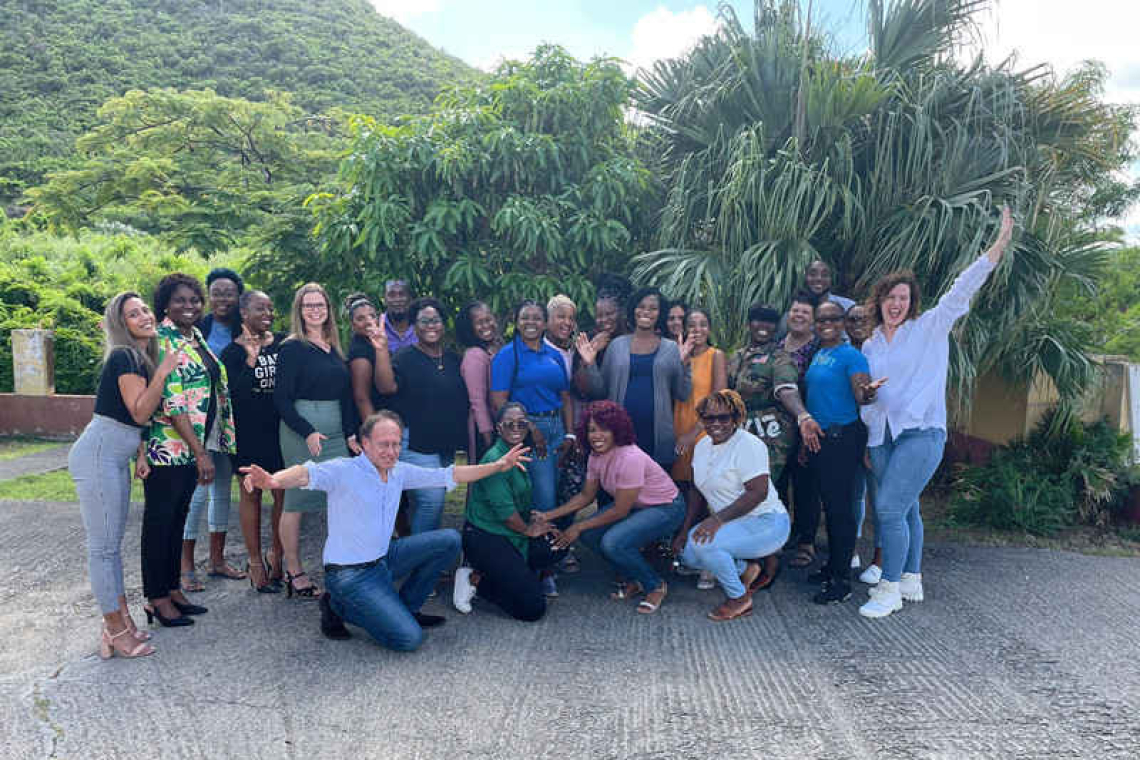PHILIPSBURG--Foundation Judicial Institutes St. Maarten (Stichting Justitiële Inrichtingen Sint Maarten, SJIS) and the Prosecutor’s Office St. Maarten OM SXM are in their second year of the project “Domestic Violence and Mediation”. “Restorative justice is here to stay,” both organisations stated.
A number of substantial services have been realised, such as the “Safe Home Training” for persons involved in relational violence, as well as victim-offender mediation in the pilot “Mediation in Criminal Cases”, SJIS and OM SXM revealed. “Organisations in the judicial – and social field are now more familiar with the concept ‘restorative justice’ and are supported in working in a more restorative way in their daily work.”
In November, the mediation skills training held in 2021 and earlier this year was followed-up. The training forms part of the restorative justice project “Domestic Violence and Mediation”, launched by SJIS and OM SXM in 2021.
The three-day intensive training facilitated a group of new trainees on day one, followed by two days of training with approximately thirty professionals working with, amongst others, relational violence cases.
“The mediation course provided a space for counsellors, social workers, case managers, probation officers, child protection officers, a psychologist, an attorney and law enforcement officers to share knowledge and practice their mediation skills,” the organisation said. “This was done through exercises in self-regulation and regulating others’ emotions, as well as practicing interventions during role-plays and learn to capture the mediation in a written agreement.”
The training started with an open floor, in which participants shared their experiences using restorative interventions, such as mediation, in their daily work. One of the law enforcement officers explained how they deal with relational violence cases and mentioned “We talk different now”, indicating how their approach has proven to be more effective.
The mediation skill training launched in May 2021 is the first step to introducing restorative justice as an alternative approach to conflicts that are usually governed by (criminal) law, specifically relational (domestic) violence cases.
Restorative justice aims at repairing the harm that has been done between parties involved in a conflict situation,” trainers explained. “The harm can consist of material and/or emotional harm. An important aspect of restorative justice is that those involved in the conflict take responsibility and accountability for his/her actions. This will also help prevent reoffending. Restorative justice is beneficial for persons harmed by violent behaviour and the community as a whole.”
Sanne Bartels, one of the two trainers, explained that with this project, St. Maarten connects with the global movement and the regional development. “It will contribute to the successful implementation of restorative justice as part of the, hopefully soon to be implemented, revised draft Code of Criminal Procedure,” she said.
Bartels is a lawyer and mediator by training, who is passionate about bringing human rights to life. She believes conflict can be transformational, when creating space for the human experience. She is dedicated to making mediation an accessible form of conflict prevention- and resolution on St. Maarten. Sanne founded her mediation- and coaching practice, where she serves a variety of clients, ranging from families to corporate clients. Compassionately guiding them through the question: “Where am I stuck and how do I get un-stuck?”.
Together with the Prosecutor’s Office and Probation department, Sanne is part of the project team introducing restorative justice in St. Maarten. She mediates cases in the pilot “Mediation in Criminal Cases” and leads a pool of aspiring mediators working in the judicial- and social domain. She is working towards her vision of making this pool of practitioners deployable throughout the community.
The second mediation trainer was Makiri Mual, who studied anthropology/post doc psychology and currently works as a couples- and family therapist alongside his mediation practice. Reflecting his fascination for conflict and conflict resolution, he combines both the domain of therapy and law.
He developed Emotionally Focused Mediation (EFM) to tackle poignant and stagnating conflicts by addressing disruptive patterns and focusing on the needs and feelings of persons concerned. This humanistic approach is applicable in- and outside the clinical setting and is currently implemented in St. Maarten via the Domestic Violence mediation training. This so-called Restorative Justice approach extends from policing through prosecution, court, probation and even post-confinement/reintegration.
Mual is the founder and co-chair of the Association for Mediators in Penal Cases in the Netherlands. He has trained professionals across the board, such as social counsellors, judges, police and lawyers.
The training provided an important part of the justice- and social chain with understanding of restorative justice and tools to apply mediation in their daily practice. The participating organisations, spread throughout the justice and social field, often work on the same cases and encounter the same clients during their work.
The participants gained additional tools to resolve challenging situations in a sustainable way. Furthermore, they are now better able to provide a uniform service to the community. The newly trained “restorative justice ambassadors” will continue to promote sustainable and peaceful conflict resolution for the benefit of the community.
In addition, the training prepared more professionals to assist with mediation in criminal cases under guidance of a professional mediator.
The mediation skills training falls under the Project Domestic Violence and Mediation financed through the Resources for Community Resilience R4CR funding program. The R4CR program was implemented by VNG International and funded by the St. Maarten Recovery and Resilience Trust Fund to improve the capacity of Sint Maarten’s civil society organisations, support reconstruction, and resilience at the community level.







